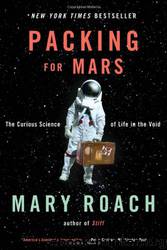Packing For Mars by Roach Mary

Author:Roach, Mary [Roach, Mary]
Language: eng
Format: epub
Tags: Non-Fiction, Humor, Historical, Science
ISBN: 9780393068474
Publisher: W. W. Norton & Company
Published: 2010-08-01T23:00:00+00:00
DAY SIX OF GEMINI VII. Frank Borman is on the mic. The exchange is proceeding in the macho, jargony manner of pilot-to-ground communications. Until:
MISSION CONTROL: Stand by for the Surgeon, Gemini VII.
BORMAN: [silence]
MISSION CONTROL: Gemini VII, this is Surgeon. Have you had any dandruff problem up there, Frank?
BORMAN: No.
MISSION CONTROL: Say again.
BORMAN: N. O. No, negative!
Commander Borman did not wish to discuss skin care. But later, in his memoir, he would write about “our scalps” and about the case of “terminal dandruff” he had. Though it probably wasn’t, technically speaking, dandruff. Dandruff is caused by an inflammatory skin response to oleic acid, which the scalp fungus Malassezia globosa excretes after dining on your scalp oils. Either you’re sensitive to oleic acid or you’re not. If Borman didn’t have dandruff before he went into space, he didn’t have it afterward, says dermatologist Jim Leyden. Leyden once paid prisoners to not wash their hair for a month, specifically to see if they developed dandruff. They did not. The flakes on Borman’s head and skin were most likely the accumulation of millions of shed skin particles—particles normally washed away in the shower—mixing with sebum and clumping together.
The atmosphere in Antarctic field camps is similarly dry and shower facilities similarly nonexistent or cumbersome, making the six-week Antarctic Search for Meteorites field season a good analog for space hygiene. “Six weeks of dead skin is like two whole layers,” says team leader Ralph Harvey. Sometimes it all comes off at once, in the first wash. Harvey admits to being fascinated by the spectacle. “I remember coming back and taking a shower and the whole end cap of my finger would just come off.”
What makes the dander situation bearable in Antarctica is that you can step outside your domicile and shake out your long johns and sleeping bag. You can’t do this in space or simulated space. The description of the Navy space cabin simulator at the end of the experiment was like a ski report. “A fine layer of powdery scales was found to cover the floor of the chamber.”
In zero gravity, the flakes never fall. I asked Lovell about this. I believe my exact words were, “Was it just like a snow globe in there?” He said he didn’t recall anything like that. Or not “of such magnitude that it would stick in my mind all these years.” (For the thing that did stick in his mind all these years, see chapter 14.)
The head in general is a problem. The majority of our sebaceous glands are attached to hair follicles, thus the unwashed scalp quickly becomes a greasy thing. So much so that the bathphobic hordes of the sixteenth century would rub powder or bran into their scalps before retiring for the night, much as homeowners today sprinkle kitty litter on motor oil spills. Like sweat, sebum develops a distinctive aroma as bacteria break it down. “At least two of the Skylab astronauts reported that their heads developed offensive odors,” noted space psychologist Jack Stuster in a 1986 NASA report on space station habitability.
Download
This site does not store any files on its server. We only index and link to content provided by other sites. Please contact the content providers to delete copyright contents if any and email us, we'll remove relevant links or contents immediately.
Tools of Titans by Timothy Ferriss(8370)
Turbulence by E. J. Noyes(8040)
Secrets of Antigravity Propulsion: Tesla, UFOs, and Classified Aerospace Technology by Ph.D. Paul A. Laviolette(5369)
Astrophysics for People in a Hurry by Neil DeGrasse Tyson(5184)
Room 212 by Kate Stewart(5105)
Design of Trajectory Optimization Approach for Space Maneuver Vehicle Skip Entry Problems by Runqi Chai & Al Savvaris & Antonios Tsourdos & Senchun Chai(5066)
Pale Blue Dot by Carl Sagan(4996)
The David Icke Guide to the Global Conspiracy (and how to end it) by David Icke(4709)
A Journey Through Divination and Astronomy by Publishing Pottermore(4382)
Goodbye Paradise(3802)
Apollo 8 by Jeffrey Kluger(3705)
COSMOS by Carl Sagan(3618)
The Five People You Meet in Heaven by Mitch Albom(3562)
Losing the Nobel Prize by Brian Keating(3534)
How to Read Water: Clues and Patterns from Puddles to the Sea (Natural Navigation) by Tristan Gooley(3466)
Brief Answers to the Big Questions by Stephen Hawking(3430)
How to Read Nature by Tristan Gooley(3335)
The Order of Time by Carlo Rovelli(3188)
A Brief History of Time by Stephen Hawking(3022)
